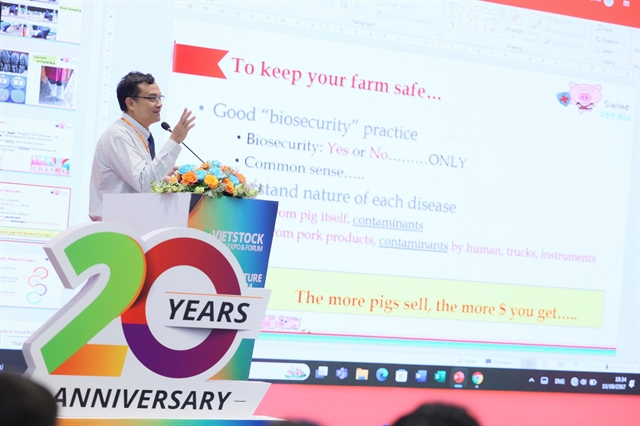 Economy
Economy

 |
| A biosecurity expert speaks at the Biosecurity Asia Forum held in HCM City on October 10. —VNS Photo |
HCM CITY — A proactive approach to biosecurity, involving applying biosecurity measures to prevent, control, and eliminate pathogens, is far more effective in protecting herds, experts said at the Biosecurity Asia Forum held in HCM City on Thursday.
The forum, organised by the Department of Livestock Production under the Ministry of Agriculture and Rural Development, featured a panel of experts who addressed important issues that will help make a difference in the fight against disease.
Topics under discussion included best practices to minimise the risk of the introduction and spread of diseases, practical information to develop and implement a comprehensive and integrated biosecurity plan for individual operations, and steps to manage a disease outbreak.
Experts also discussed a biosecurity checklist to identify, manage, and protect against potential disease risks and develop a mindset and culture to increase the adoption of biosecurity practices.
Livestock, poultry, and aquaculture producers and supply chain firms from feed mills to processing plants attended the forum to get information on how to protect their business and the industry by implementing effective biosecurity measures to minimise the introduction and spread of diseases.
More than ever, devastating disease outbreaks, such as African swine fever, foot-and-mouth disease, avian influenza, and white spot syndrome in shrimp have made clear the importance of effective biosecurity programmes that prevent, control, and eradicate infectious diseases, experts said.
Furthermore, reducing disease is key to decreasing the need for antimicrobials like antibiotics, thereby minimising antimicrobial resistance.
Over the past decade, the livestock industry has maintained an annual growth rate of 5-7 per cent, according to the Department of Livestock Production.
In 2023 alone, despite difficulties due to the impact of the global economic downturn, decreased consumption, diseases, and complex climate change, the livestock industry still grew by 5.7 per cent.
The total production value of the livestock industry contributes 26 per cent to the agricultural GDP and more than 5 per cent to the country’s GDP.
The ratio between household farming and concentrated farming is 55 per cent and 45 per cent, respectively.
The output of livestock products certified by VietGAHP (Vietnamese Good Animal Husbandry Practices) accounts for only 15 per cent.
“Everyone working in the industry needs to be aware of the potential for disease outbreaks, it is a shared responsibility for all stakeholders,” said Rose Chitanuwat, regional portfolio director – ASEAN, Informa Markets.
In response to the increasing threats posed by diseases in livestock and aquaculture in Việt Nam, Informa Markets continued to support a proactive approach to biosecurity with the forum.
The Biosecurity Asia Forum is part of Vietstock Expo & Forum 2024 organised by Informa Markets in HCM City from October 9- 11. —VNS




